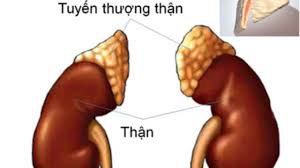Treatment of benign adrenal tumors
This is an automatically translated article.
The article was professionally consulted with Specialist Doctor I Nguyen Hung - Doctor of Endocrinology - Department of Medical Examination & Internal Medicine - Vinmec Danang International General Hospital.
Benign adrenal tumor is a rare, usually noncancerous tumor. Most benign adrenal tumors cause no symptoms and do not require treatment. But if this tumor secretes too much hormone, it will cause some serious damage to other organs, especially the cardiovascular system.
1. Symptoms of Benign Adrenal Tumors
Most people will not feel or have any symptoms to detect a benign tumor in the adrenal gland. Patients are diagnosed only when they go for regular health check-ups or go to the doctor for other diseases.
Although an adenoma is a rare tumor, it is not usually cancerous; However, it still has the ability to turn cancerous, making the diagnosis between a benign adrenal tumor and a cancerous tumor quite difficult. Therefore, the doctor will perform urine and blood tests to evaluate the patient's hormone levels and imaging techniques.
Although an adenoma is a rare tumor, it is not usually cancerous; However, it still has the ability to turn cancerous, making the diagnosis between a benign adrenal tumor and a cancerous tumor quite difficult. Therefore, the doctor will perform urine and blood tests to evaluate the patient's hormone levels and imaging techniques.

Phần lớn các trường hợp u tuyến thượng thận thường không có các dấu hiệu biểu hiện ra bên ngoài
1.1 Tumor in the adrenal cortex
The patient will have symptoms based on the hormone the tumor produces, such as:
If there is too much aldosterone, the patient will have Conn syndrome which causes high blood pressure, low potassium levels, weakness and cramps and other symptoms. Other problems. Too much cortisol leads to Cushing's syndrome, which causes symptoms such as an enlarged abdomen, round face and pink or purple stretch marks, mood swings, and a higher risk of diabetes. Too much sex hormone, the patient will have different problems depending on the sex of the patient. In women, too much testosterone can cause problems such as no periods and baldness. In men, too much estrogen reduces libido and erectile dysfunction.
If there is too much aldosterone, the patient will have Conn syndrome which causes high blood pressure, low potassium levels, weakness and cramps and other symptoms. Other problems. Too much cortisol leads to Cushing's syndrome, which causes symptoms such as an enlarged abdomen, round face and pink or purple stretch marks, mood swings, and a higher risk of diabetes. Too much sex hormone, the patient will have different problems depending on the sex of the patient. In women, too much testosterone can cause problems such as no periods and baldness. In men, too much estrogen reduces libido and erectile dysfunction.
1.2 Tumor in the adrenal medulla
This type of tumor is called an adrenal myeloma, and it is rare and usually not cancerous. In this case, the tumor overproduces epinephrine or norepinephrine into the bloodstream causing high blood pressure, flushed or sweaty face, headache, and heart palpitations.
2. Diagnosis of benign adrenal tumor
In addition to a physical exam and asking about current symptoms and medical history, the doctor will order the following imaging techniques to diagnose an adrenal tumor:
Computed tomography (CT) scan) Magnetic resonance imaging (MRI) and/or positron emission tomography (PET). Tests that evaluate the levels of certain hormones in the blood or urine are used to determine if an adrenal tumor is active. In addition, some patients may need a biopsy of the tumor to confirm the diagnosis.
Genetic testing is not usually indicated for people with adrenal tumors, because most of these tumors occur by chance and are not caused by genetic mutations. However, genetic testing may be indicated for people with genetic conditions that increase the risk of adrenal adenomas, such as hereditary multiple endocrine neoplasia type 1 (MEN1). and familial adenomatous polyposis.
Computed tomography (CT) scan) Magnetic resonance imaging (MRI) and/or positron emission tomography (PET). Tests that evaluate the levels of certain hormones in the blood or urine are used to determine if an adrenal tumor is active. In addition, some patients may need a biopsy of the tumor to confirm the diagnosis.
Genetic testing is not usually indicated for people with adrenal tumors, because most of these tumors occur by chance and are not caused by genetic mutations. However, genetic testing may be indicated for people with genetic conditions that increase the risk of adrenal adenomas, such as hereditary multiple endocrine neoplasia type 1 (MEN1). and familial adenomatous polyposis.
3. Treatment of benign renal adenoma

Một trong những biện pháp điều trị u tuyến thận lành tính là mổ nội soi u tuyến thượng thận
The best treatments for an adrenal tumor depend on many factors, including whether the tumor is active. People who have an adrenal tumor that doesn't release hormones (doesn't work) usually don't need immediate treatment. However, they still need regular follow-up with a regular physical exam to determine if the tumor is growing and to make sure it doesn't start producing hormones.
Surgery for adrenal tumors is a common surgical treatment in cases where the tumor is active. Tumor removal often resolves conditions resulting from adrenal hypersecretion, such as primary hyperaldosteronism, Cushing's syndrome). In some cases, an active adrenal tumor can be treated with medications that either block the hypersecretory activity or reduce the levels of the overproduced hormone.
Laparoscopic surgery for adrenal tumors is a difficult technique, because the tumor is located posteriorly in the peritoneal cavity, located between the liver, kidney and large blood vessels, and the way the blood vessels of the adrenal gland empty directly into the vena cava . Therefore, it is required that medical facilities need to be equipped with advanced techniques, and doctors need to have expertise, experience and high skills.
Endoscopic adrenalectomy at Vinmec International Hospital, patients will be examined and treated with a team of leading medical experts, a team of highly specialized and experienced surgeons . The system of equipment is invested in modern machinery, the most advanced sterile operating room, high-tech imaging techniques such as CT scan, MRI, PET, targeted therapy at General Hospital. Vinmec International helps to detect and screen tumors with high accuracy; Ensure the surgery is carried out safely and with the highest efficiency.
Surgery for adrenal tumors is a common surgical treatment in cases where the tumor is active. Tumor removal often resolves conditions resulting from adrenal hypersecretion, such as primary hyperaldosteronism, Cushing's syndrome). In some cases, an active adrenal tumor can be treated with medications that either block the hypersecretory activity or reduce the levels of the overproduced hormone.
Laparoscopic surgery for adrenal tumors is a difficult technique, because the tumor is located posteriorly in the peritoneal cavity, located between the liver, kidney and large blood vessels, and the way the blood vessels of the adrenal gland empty directly into the vena cava . Therefore, it is required that medical facilities need to be equipped with advanced techniques, and doctors need to have expertise, experience and high skills.
Endoscopic adrenalectomy at Vinmec International Hospital, patients will be examined and treated with a team of leading medical experts, a team of highly specialized and experienced surgeons . The system of equipment is invested in modern machinery, the most advanced sterile operating room, high-tech imaging techniques such as CT scan, MRI, PET, targeted therapy at General Hospital. Vinmec International helps to detect and screen tumors with high accuracy; Ensure the surgery is carried out safely and with the highest efficiency.
Please dial HOTLINE for more information or register for an appointment HERE. Download MyVinmec app to make appointments faster and to manage your bookings easily.
Articles source references: Webmd.com and Mayoclinic.org
This article is written for readers from Sài Gòn, Hà Nội, Hồ Chí Minh, Phú Quốc, Nha Trang, Hạ Long, Hải Phòng, Đà Nẵng.





